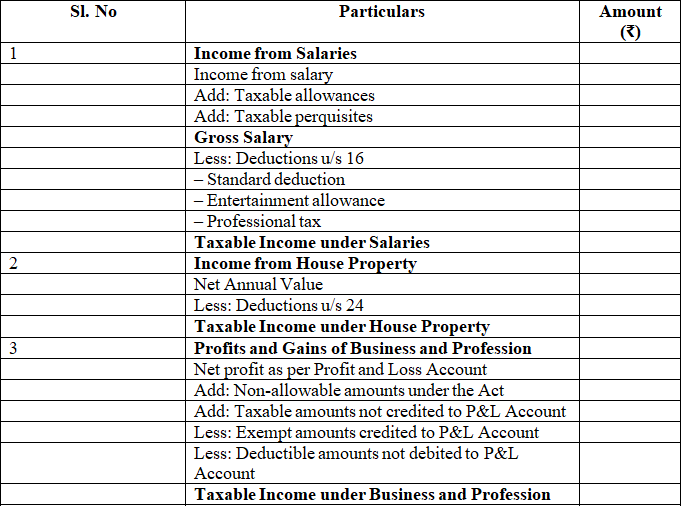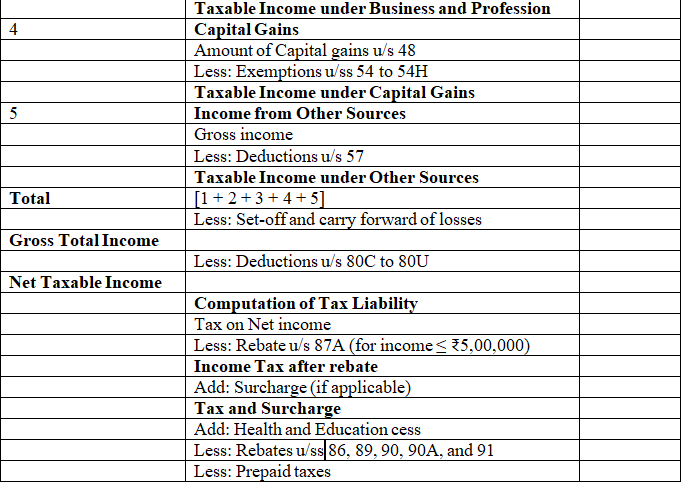Basic Concepts of Income Tax | UGC NET Commerce Preparation Course PDF Download
Income Tax Law
Income tax is a tax imposed on the total income of a taxpayer, defined as a person liable under this Act, for the relevant financial year. To comprehend the Income Tax law in India, one must carefully study the following components:
- Income-tax Act, 1961: This legislation governs the levy of income tax in India. Enacted on April 1, 1962, it consists of 298 sections and XIV schedules. The Act covers aspects like determining taxable income, tax obligations, assessment procedures, appeals, penalties, and prosecutions. It undergoes annual revisions through additions and deletions made by the Annual Finance Act passed by the Parliament.
- Annual Finance Acts: Each year, the Finance Minister introduces a Finance Bill during the Parliament's Budget Session. Upon approval by both Houses of Parliament and the President's assent, the Finance Bill transforms into the Finance Act. Amendments to the Income-tax Act, 1961, and other tax laws are incorporated through the Finance Act. The Finance Bill also specifies the Income tax rates and other tax details outlined in various schedules attached to it. Therefore, while the Income-tax Act remains a stable law, its practical application is determined by the Annual Finance Act.
- Income-tax Rules, 1962: Central Board of Direct Taxes (CBDT) oversees the administration of direct taxes and is authorized under section 295 of the Income Tax Act to create rules to facilitate the Act's objectives. These rules, collectively known as Income-tax Rules, 1962, were initially established in 1962 to ensure the proper implementation of the Income-tax Act, 1961. It is crucial to understand these rules in conjunction with the Income-tax Act, 1961.
The authority to formulate rules under this section includes the ability to apply them retrospectively, starting from the Act's commencement date. However, any retrospective application should not unfairly prejudice the interests of taxpayers. - Circulars and Notifications: Circulars are periodically issued by the CBDT to address specific issues and clarify uncertainties related to the provisions of the Income Tax Act. These circulars serve as guidance for officers and taxpayers. While binding on the department, they do not hold the same weight for taxpayers, who can benefit from favorable circulars.
Notifications, on the other hand, are released by the Central Government to enforce the Act's provisions. For instance, under section 10(15)(iv)(h), the Central Government exempts interest on bonds and debentures subject to specified conditions through notifications. Additionally, the CBDT has the authority to establish and modify rules through notifications, such as prescribing guidelines for skill development projects under section 35CCD. - Judicial decisions:
- Significance: Judicial decisions play a crucial role in interpreting income tax laws as they fill gaps left by legislation.
- Supreme Court rulings: Decisions made by the Supreme Court are binding across the nation and establish legal precedents.
- High Court rulings: Decisions by High Courts apply within the states where the respective High Courts have jurisdiction.
Charge of Income-tax: [Sec. 4]
Taxation in India is authorized by law, particularly through Section 4 of the Income-tax Act, 1961, granting the Central Government the power to levy income tax. This pivotal section outlines the following key points:
- Tax Rates: Tax rates for each year are set by the Annual Finance Act.
- Entities Taxed: Every individual specified under section 2(31) is subject to taxation.
- Income Tax Basis: Tax is based on the total income earned during the previous year, not the assessment year, with exceptions noted in sections 172, 174, 174A, 175, and 176.
- Compliance: Taxation must adhere to the provisions outlined in the Act.
Section 4 is foundational in income tax law, as it is the primary provision from which a person’s tax liability originates.
Assessment Year
Assessment year is a 12-month period starting on 1st April every year. It is the year in which the total income earned in the previous year is taxed. For example, income earned in the previous year 2022-23 is taxed in the assessment year 2023-24 (1.4.2023 to 31.3.2024).
Previous Year
The previous year is the year in which income is earned. It is the financial year immediately before the assessment year. Taxes on income earned in the previous year are paid in the assessment year. All taxpayers follow a consistent previous year, starting from 1st April to 31st March.
Person: [Sec. 2(31)]
Income tax is imposed on the total income of the previous year of every 'person.' It's crucial to understand who falls under the term 'Person.' Here are the seven categories:
- Individual
- Hindu Undivided Family (HUF)
- Company
- Firm
- Association of Persons (AoP) or Body of Individuals (BoI), whether incorporated or not
- Local authority
- Artificial juridical person not fitting into the above categories, like a university or deity
According to Explanation to Sec. 2(31), an AoP/BoI/Local authority or any artificial juridical person is considered a 'person,' regardless of whether they were formed for profit-making purposes or not.
Assessee: [Sec. 2(7)]
Assessee refers to a person who is liable to pay any tax or sum of money under the relevant tax laws. It encompasses the following categories:
Categories of Assessee:
- Every individual subject to a tax assessment procedure under this Act is considered an assessee. This includes situations where the assessment of their income is being carried out.
- Any person recognized as an assessee as per the provisions of this Act. This extends to cases where an individual is responsible for the income of another person, like the legal representative of a deceased individual.
- Any individual categorized as an assessee in default according to the Act. For instance, if a person is obligated to deduct tax at the source but fails to do so or does not remit the deducted tax to the government, they are considered an assessee in default.
Principles relating to Income under Income-tax Act

The following are important principles relating to income:
- Income generally refers to revenue receipts. However, under the Income-tax Act, 1961, certain capital receipts like capital gains from the sale of assets such as land are also considered as income.
- For tax purposes, income is considered as net receipts, not gross receipts. Net receipts are calculated by deducting the expenses related to earning such receipts.
- Income can be taxable either on a due basis or a receipt basis, as specified under the respective head of income.
- When computing income under the heads 'Profits and gains of business or profession' and 'Income from other sources', the accounting method regularly followed by the taxpayer should be considered, which can be either the cash system or mercantile system.
- Income earned during the year (previous year) is chargeable to tax in the next year (assessment year). For example, income from the Previous Year 2022-23 will be taxed in the Assessment Year 2023-24.
- There are exceptions to the above principle known as Accelerated assessments under sections 172, 174, 174A, and 175, which are discussed in the chapter 'Liability in Special Cases'.
Income: [Sec. 2(24)]
The definition of 'Income' under section 2(24) is broad and non-exhaustive, meaning certain items may be considered as income based on their general meaning, even if they are not specifically listed. The term 'Income' includes:
- Profits and gains
- Dividends
- Voluntary contributions to trusts for charitable or religious purposes, or to educational institutions, hospitals, or electoral trusts
- Perquisites or profits in lieu of salary taxable under section 17
- Special allowances for office or employment duties
- Benefits or perquisites received by directors or persons with substantial interest in a company
- Benefits or perquisites to a trustee or representative assessee
- Sums chargeable under sections 28, 41, and 59
- Capital gains taxable under section 45
- Profits from insurance businesses or co-operative societies
- Winnings from lotteries, games, gambling, or betting
- Contributions received from employees for provident or welfare funds
- Amounts received from Keyman insurance policies
- Certain sums taxable under section 56(2)
- Money or property received without consideration as per section 56(2)(vii) or (via)
- Consideration from share issues exceeding fair market value under section 56(2)(viib)
- Forfeited advances from capital asset negotiations
- Compensation or payments referred to in section 56(2)(xi)
- Assistance in the form of subsidies, grants, or reimbursements from the government, except those covered under section 43(1) or for the corpus of a trust established by the government.
Heads of Income
- Salaries: Covered under Sections 15 to 17 of the Income-tax Act, 1961.
- Income from House Property: Regulated by Sections 22 to 27.
- Profits and Gains of Business or Profession: Governed by Sections 28 to 44DB.
- Capital Gains: Addressed in Sections 45 to 55A.
- Income from Other Sources: Detailed in Sections 56 to 59.
Gross Total Income: Gross Total Income is the sum of income computed under the aforementioned five heads, considering clubbing provisions, and adjustments of set off and carry forward of losses.
Total Income and Computation of Tax Liability
Total income refers to the Gross Total Income (GTI) after deductions available under sections 80C to 80U.


 |
Download the notes
Basic Concepts of Income Tax
|
Download as PDF |
Exemption and Deduction in respect of income
- Exemption for income means that specific income doesn't contribute to any income category, thus not counted in total income calculation.
- Deduction for income entails including the income under the relevant income category for Gross Total Income calculation, allowing deductions afterward. These deductions can be claimed from the specific income category or from the Gross Total Income.
- Specific payments or contributions can qualify for deductions. For instance, Section 10 exempts certain incomes, while sections 54, 54b, 54d, 54ec, 54f, 54g, 54ga, 54gb, 54H offer exemptions for capital gains. Section 16 covers deductions like standard deduction, entertainment allowance, and professional tax from gross salary. Section 24 provides standard deduction and interest deduction on loans under 'Income from House Property.'
- Chapter VI-A (sections 80C to 80U) allows deductions from the assessee's gross total income.
- Exemptions cannot surpass taxable income, but deductions can exceed it.
Rounding off of Income: Section 288A
The total income calculated as per the Income Tax Act will be rounded off to the nearest multiple of Rs. 10. If the last digit is five or more, it will be rounded up to the next higher multiple of 10. If the last digit is less than five, it will be rounded down to the next lower multiple of 10.
Rounding off of Tax: Section 288B
The total income tax amount and refund due, computed according to the Act, will be rounded off to the closest multiple of Rs. 10. If the last digit is five or more, it will be rounded up to the next higher multiple of 10. If the last digit is less than five, it will be rounded down to the next lower multiple of 10.
Disclaimer
The information on this website serves as general information and not legal advice. While efforts are made to ensure accuracy, Taxmann holds no liability for any misinformation.
Taxmann
Taxmann Publications has an internal Research & Editorial Team composed of Chartered Accountants, Company Secretaries, and Lawyers. Led by editor-in-chief Mr. Rakesh Bhargava, this team is committed to delivering accurate and trustworthy content. They employ a six-sigma method aimed at achieving zero errors in their publications and research platforms.
Their process involves several key practices:
- Sourcing statutory information from authorized, credible sources.
- Ensuring all recent judicial and legislative updates are included.
- Creating analytical pieces on relevant and complex topics to help readers grasp the concepts and implications.
- Guaranteeing that all published content is comprehensive, precise, and clear.
- Supporting evidence-based statements with proper legal references like Sections, Circular Numbers, and Notifications.
- Strictly adhering to rules of grammar, consistency, and style.
- Using a clear, uniform font and size across both print and digital formats for readability.
|
235 docs|166 tests
|
FAQs on Basic Concepts of Income Tax - UGC NET Commerce Preparation Course
| 1. What is the meaning of the term 'Assessment Year' in Income Tax Law? |  |
| 2. What is the 'Previous Year' as per the Income Tax Act? |  |
| 3. Who qualifies as a 'Person' under Section 2(31) of the Income Tax Act? |  |
| 4. What are the different 'Heads of Income' as per the Income Tax Act? |  |
| 5. What is the significance of exemptions and deductions in income tax? |  |


































